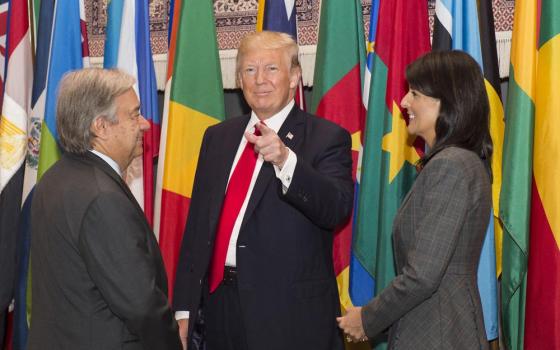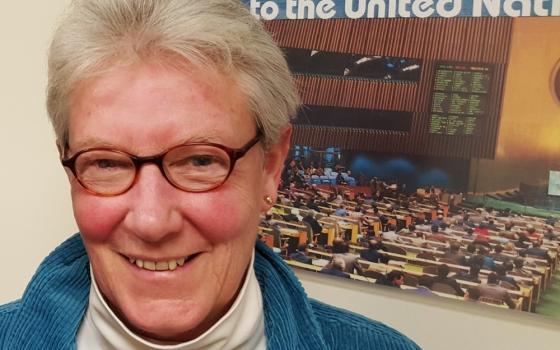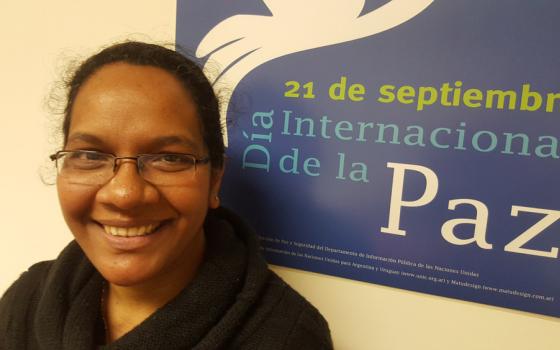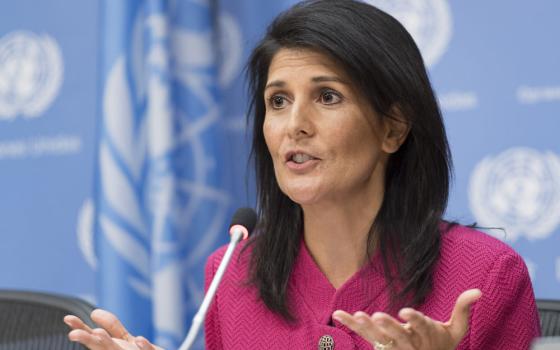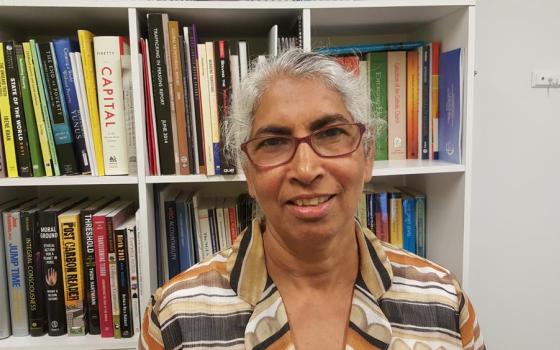A year into the presidency of Donald Trump, Catholic sisters working at the international level say they have grown frustrated, weary and even angry with the direction Trump's administration is taking the United States in its relations with the rest of the world.
The frustration is particularly acute among the sisters who represent their congregations at the United Nations. As strong supporters of the U.N.'s dedication to international cooperation in what they describe as an increasingly interconnected and globalized world, the sisters say they are worried and dismayed about the Trump administration's go-it-alone "America First" foreign policy.
"When national self-interest trumps the common good — well, that's a never-ending dilemma at the United Nations," said Sr. Margaret Mayce, an American who represents the Dominican Leadership Conference at the U.N. "But it's in our face now."
Mayce said she does not want to "impugn people," but nonetheless, it looks more and more like the U.N. values of international cooperation and mutual accountability "are not values for the present administration," she said.
Indian Sr. Justine Gitanjali Senapati, who represents the Congregations of St. Joseph at the world body and who expressed concern after Trump's 2016 election about what his presidency could portend for women, people who live in poverty and migrants, said any possible wait-and-see moment for the Trump administration is over.
In an interview with Global Sisters Report, Senapati said she and others have to stand for the "one common global voice" that the United Nations represents.
"How can we be silent in the face of injustice?" she asked, adding that Catholic sisters have "to take a stand for what is right. We can't be silent."
Mayce, Senapati and other sisters provide a long list of frustrations with the current administration. These include:
- The U.S. withdrawal from the U.N.-negotiated Paris agreement on climate change;
- A similar withdrawal from negotiations on a U.N.-sponsored set of international compacts on migration and refugees;
- Comments made by Nikki Haley, the U.S. ambassador to the United Nations, that she was "taking names" of countries that criticized the United States for its decision to move the U.S. Embassy in Israel from Tel Aviv to Jerusalem.
Trump's recent comments about immigration and his rumored crude characterization of Haiti and countries in Africa as "shithole" countries — a term Trump denies using — have also fueled anger among sisters working at the United Nations.
"I was personally outraged by that," Senapati said. "It's racist. It's a pure racist comment."
That outrage goes beyond the United Nations: In a statement issued earlier this week in connection with Martin Luther King Jr. Day, the Michigan-based Adrian Dominican Sisters did not mention Trump by name but said, "Our national sense of decency is [being] assaulted by coarse and disrespectful public discourse, and our sense of unity fractured by words and actions that sow hatred and division."
Less circumspect was Sr. Denise Desil, the mother general of the nearly 200-member Haitian congregation the Little Sisters of St. Thérèse of the Child Jesus. Desil, who lives and works in Haiti but travels frequently to the United States, told GSR reaction in Haiti to Trump's comments was "shame for the human being [who] doesn't know that we are all the children of God. The skin [color] means nothing. We have the same blood in our body. I am proud of my color. We need to respect others."
For the sisters at the U.N., the comments merely capped a year of growing impatience over U.S. policies.
Senapati said the U.S. decision to pull out of the Paris climate agreement was particularly egregious, calling it "a danger to the world." She said it is troubling that the most powerful country in the world "is not able to read the sign of the times."
What the United States is doing, she said, is antithetical to U.N. values and creates enemies for the U.S. at the world body and globally.
"It's alarming," she said.
Mayce said pulling out of negotiations over the migration pact was particularly telling of where U.S. policy is heading.
In 2016, President Barack Obama's administration supported the United Nations' New York Declaration, a major step toward debate this year of two international compacts, one focused on "a set of common principles and approaches" on migration overall and the second on refugees.
The New York Declaration calls for the protection of "the human rights of all refugees and migrants, regardless of status," including the rights of women and girls "and promoting their full, equal and meaningful participation in finding solutions."
In her Dec. 2 statement announcing the withdrawal, Haley hailed what she called the United States' immigrant heritage and "our long-standing moral leadership in providing support to migrant and refugee populations across the globe. No country has done more than the United States, and our generosity will continue.
"But our decisions on immigration policies must always be made by Americans and Americans alone," she said. "We will decide how best to control our borders and who will be allowed to enter our country. The global approach in the New York Declaration is simply not compatible with U.S. sovereignty."
In an interview with GSR, Mayce said the announcement was worrisome because the migration issue is global in scale, and the United States should be part of the discussion of how to address it.
"To pull yourself out of that as if nothing at the international level has anything to do with us is just stunning," she said.
Mayce labeled current U.S. immigration policy inadequate, noting that countries "much smaller than the U.S." are admitting greater numbers of refugees fleeing wars from the Middle East than the United States.
But, she added, even if a country had decided to limit the number of those being admitted in, "you should still be at the table, trying to determine how else you could help. It's a global problem, a global phenomenon, and every country has a role to play."
Mayce faulted Haley, a former governor of South Carolina and daughter of Indian immigrants, for "following suit" on Trump's nationalist rhetoric and said taken together, the policies and statements of the last year are "putting the U.S. in a very bad light." (On Jan. 18, Politico reported that global approval of U.S. leadership in Trump's first year dropped to a record low of 30 percent, according to a Gallup poll.)
Adding to concerns: The United States Mission to the United Nations does not seem to have much interest in a dialogue with the nongovernmental organizations, or NGOs, including the sisters' congregations, said Sr. Teresa Kotturan, U.N. representative for the Sisters of Charity Federation.
Consistent communications from the U.S. Mission — even regular email blasts — seem to have stopped, said Kotturan, who called the U.S. Mission "inaccessible."
"There has been no relationship with NGOs for the last year. It seems to be an avenue that is closed." (The U.S. Mission to the U.N. did not respond to a request for comment.)
Kotturan, Mayce and others said Samantha Power, Haley's predecessor at the U.N., welcomed dialogue with NGOs, even if they did not agree with U.S. policies. The sisters said they would welcome a dialogue with Haley.
"What I miss is global solidarity, to enter into a dialogue, to understand each other, so we can solve a problem and partner in peace-building and bring about security," Kotturan said.
"We want to build bridges," Kotturan said of the work of NGOs and the sisters' congregations. "The focus should always be on peace-building in the world."
[Chris Herlinger is GSR international correspondent. His email address is cherlinger@ncronline.org.]
